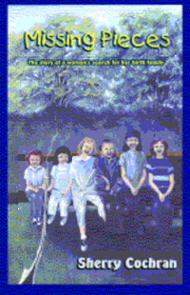
Missing Pieces
Sherry CochranReview by Alyce Wilson
Missing Pieces: A Woman's Search for Her Birth Family is both
a personal revelation and a mystery of sorts, as the main character
in this autobiographical work searches for her long-lost family and
tries to make sense of the abuse she suffered as an adopted child.
Sherry Cochran goes back and forth between experiences she had as a girl, first in the foster care system and then under an abusive adoptive mother and an ineffective adoptive father, with chapters set in the present, chronicling her efforts to locate her biological family from whom she had been separated.
Because she starts the action right in the thick of things and then, through flashbacks, provides more background, she draws the reader in right from the beginning and engages them in a tale that, while horrifying at times, is ultimately inspiring.
She writes, in the introduction to the book, that sometimes when she rereads sections about the abuse she suffered under her adoptive mother, she finds it hard to believe that anyone could have survived it. And yet, she did survive. And what's more, she did not let that experience destroy her. Instead, she found a way to get something good out of it. This book is one of those things.
Cochran states very clearly that her goal, in part, is to increase understanding about the failings of the foster care system, the reality of abuse and the challenges faced by children with disabilities. She has hereditary deafness which didn't start to manifest until she neared adulthood and which may have been aggravated by the traumas suffered under her adoptive mother's beatings. Since then, she has become active in the hearing loss community.
The story is so powerful in part because Cochran evokes all the senses in her memories of her experiences. She recalls details which are heartbreakingly tangible, helping the reader to experience what she went through and understand what it means to achieve victory over that abuse.
If there is one weakness in the book, it is her choice to use first-person for the present day chapters and third-person for the chapters set in the past. This is jarring at first to the reader but would be very easy to fix if she chose to do so.
Missing Pieces would be excellent to read not only for the average reader but also for anyone entering the social services, health or related fields, providing a first-person account of what it means to live through abuse and strategies for escaping that abuse finding healing.
KiwE Publishing, 2004: ISBN: 1-931195-09-9